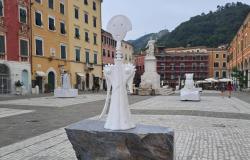“Yes, we live in a service society. We are not used to the concept of having to suffer to get something”. She gets straight to the point Maria Dill who, after a series of documentaries and short films, makes his debut in a notable fiction film, Stray animals. In fact, the point that opens our video interview is linked to a phrase pronounced by Ivan Franek: “Strays no longer exist”. A phrase that could extend to the profound meaning of the film, in which two paramedics, played by Giacomo Ferrara e Andrea Lattanzi, aboard a dilapidated ambulance, transport a man (Franek) from Abruzzo to Serbia who has decided to end it all. With him, the daughter he hasn’t seen for a long time (Agnese Claisse), angry and then softened, in a dramatic road movie yet capable of being revealing and tender.
“We live in a closed world, turned in on itself, we are all busy with ourselves, with our phone”continues Andrea Lattanzi, about a world that seems increasingly domesticated, revisited by the director through the filter of two young men who are opposites but continuous in the emotional revelation that they will find themselves facing. According to Giacomo Ferrara, Stray animals shifts the center of attention, observing the emotions, often silenced, and the sense of freedom itself from another angle. “This fact of having everything immediately is convenient, it allows us to obtain things without difficulty, but it takes away our decoding, and does not allow us to fully experience them. As instead happens to the protagonists of the story, who will return to feel their emotions through the sense of travel”. And if we are talking about emotions, the theme of theeuthanasia denied she is observed with lucid pain by Maria Tilli, in a very strong sequence that anticipates the ending “Staging a pet instead of a person brings the concept closer to people. Because for our animals we grant a painful but kind concession, because we do not want to see them suffer. For humans this is still not no. And I think it’s absurd”.
Stray Animals: interview with Maria Tilli, Giacomo Ferrara, Andrea Lattanzi
Written by Maria Tilli together with Matteo Corradini and Fabrizio Franzini, based on a story by Chiara Leonardi, Stray animals he best identifies the characters through the Abruzzo accent. An obsolete inflection for Italian cinema, and therefore functional to the real identification of the narrative. “The Sicilian is the mafia film, the Roman is the film of the suburbs and hardship, the Milanese is the cinepanettone, and then in the fiction there is nothing, no accent”the director tells us “Language brings an element of reality that cannot be betrayed. And Andrea and Giacomo were very good”.
According to Giacomo Ferrara, born in Chieti, “For the first time I had the opportunity to use my accent in a movie. This is a slow film, deliberately slow, because it helps to better explore the relationships between the various characters. In contrast to Andrea’s character, who is more energetic and on edge, my Toni is slower, uses a more drawn-out Abruzzese, stretching out the tone like a corny piece of music.”. For Andrea Lattanzi, however, the accent has to do with memory: “I lived part of my life in San Polo dei Cavallieri, a small town between Lazio and Abruzzo. Their accent is a mix between Roman and Abruzzo, and I imagined the character like this, talkative and nervous. I have an ear , and so this helps me..
Stray Animals, the review: an authentic film in a domesticated world
The Importance of Saying ‘No’
At the end of the interview, a thought on the precariousness of independent Italian cinema. A cinema of new authors, of real stories, of aesthetics and great stories. Stray Animals, as already written in our review, is part of this whole, to be looked after and preserved. But how does indie cinema in our country defend itself today? “Arguing a lot, and taking it to the room. You fight every day, for many choices. I’ve never said so many ‘no’s’ in my life”explains Maria Tilli.
Andrea Lattanzi then thinks about the experience that can come from a film like this: “Italian cinema has had its legs cut off, so it is important to support the economy, thinking about the whole set. It is essential to make films like this, to enrich ourselves, to gain experience”. And if Maria Tilli is undoubtedly a director to keep an eye on, Giacomo Ferrara focuses on the renewed poetics that comes from younger directors: “Everything is becoming standardized, but the arrival of new authors is able to give a deeper and more personal vision of the stories. And it is important to let young directors and authors debut”.






